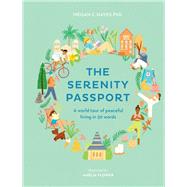
What is included with this book?
Megan Hayes is a researcher, writer, and pioneer of the Positive Journal® approach to personal writing. She is an expert in positive psychology, always seeking new techniques to help people flourish and find happiness.
Regularly presenting her research at conferences across the globe, Megan is passionate about helping others find the tools they need to improve their wellbeing. She also has a personal interest in mental health issues, having grown up with a mother and sister who both experienced bi-polar episodes.
Megan is the author of Write Yourself Happy, The Happiness Passport and The Serenity Passport.
The New copy of this book will include any supplemental materials advertised. Please check the title of the book to determine if it should include any access cards, study guides, lab manuals, CDs, etc.
The Used, Rental and eBook copies of this book are not guaranteed to include any supplemental materials. Typically, only the book itself is included. This is true even if the title states it includes any access cards, study guides, lab manuals, CDs, etc.